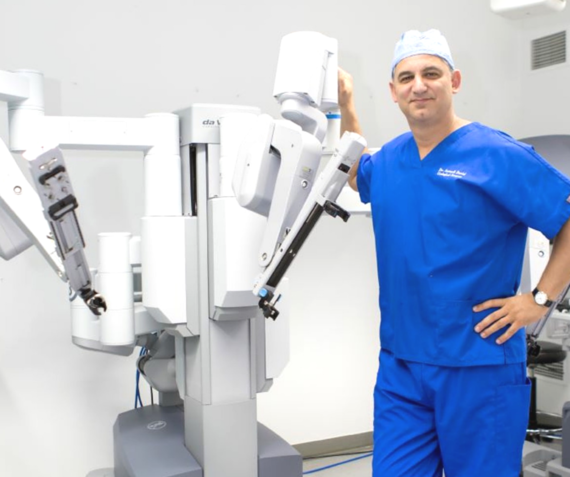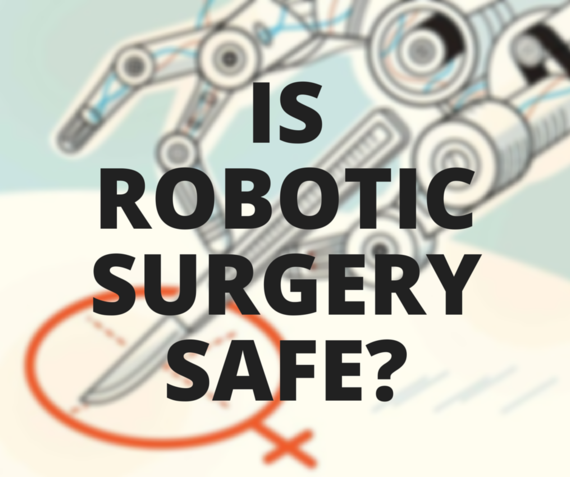Robots performing surgery? How is this possible? Is it safe? These were some of the questions and criticisms of robotic surgery back in 2000 when I began as one of the pioneers in the field of prostate cancer adopting the technology.
Over 1.7 million robotic procedures were performed between 2007 and 2012 in the U.S., with the majority being in the fields of gynecology and urology, according to a recent report from the FDA.
Robotic surgery has always received criticism around safety concerns, but as a daily practitioner of the da Vinci Robotic Surgical System, I can tell you, in the hands of experienced surgeons, robotic surgery is safe.
This debate has arisen once again this month due to a report released from researchers at the University of Illinois at Urbana-Champaign, Massachusetts Institute of Technology and Chicago's Rush University Medical Center, which showed that robotic surgery had a total of 8,061 device malfunctions resulting in 1,391 injuries and 144 deaths.
Some of the malfunctions listed in the report went from equipment sparking during an operation, uncontrollable movement of the instruments and loss of video feed during the procedure. Now, this could mean the device itself needs further evaluation and testing regarding the malfunctions. It could also mean the robot wasn't set up correctly prior to the surgery. But even further, I'm going to go out on a limb and ask if this report evaluated the experience and skill of the surgeon and his or her team?
The study authors even admitted their uncertainty regarding the root cause of these problems and whether it's the fault of the robot or the surgery team. Even as rare as robot malfunctions are, inexperienced surgeons jumping behind the robot and not knowing how to fully operate it could be linked to these incidents.
No one can argue that experience matters above all else when it comes to any surgery. But you may be surprised to find that some surgeons take a weekend course and come back on Monday and claim they're "robotic surgeons." A skilled surgeon plus the technology of robotics, will result in a positive outcome as opposed to a surgeon who is not well-trained and inexperienced, which is quite dangerous.
When patients look for a robotic surgeon, the key message I want to convey is patients need to understand the skill and experience of the surgeon, and be sure they're not just robot technicians, who are familiar with the device. But even further, make sure they're experts in their respective fields whether it's oncology or neurology. If all that checks out, then that experienced surgeon has the tremendous benefits that the robot brings, which are 3x magnification, and better range of motion. These advances dramatically decrease the amount of blood in the field, giving the surgeon almost perfect vision. If used properly by a skilled surgeon, robotic surgery is a major upgrade from open surgery. With open surgery, there's a lot of blood in the field and because of this, we can't see well. Instead, we have to use our hands, and tactile feedback to progress the surgery. But this causes a lot of damage and with cancer surgery especially, that lack of precision doesn't ensure all of the cancer is removed.
Robotic surgery gives greater precision, which leads to a better outcome for the patient. Because there's hardly any blood in the field, you can see what you're doing, and if you can see, you don't need to touch.
Think of the robot as an extension of the surgeon's arms.
Another issue we need to address centers around who is actually doing the operation? Right here in New York City, we have some hospitals where the surgeon goes from room to room, only performing part of the surgery. I truly believe that's bad medicine. The surgeon should be fully committed to the patient and perform the entire case from beginning to end.
The big question is what if the robot breaks during surgery. Can your surgeon switch to laparoscopic technique or convert to open surgery in an instant if necessary? These are the key questions and where experience really matters. Surgeries can be unpredictable and often the surgeon cannot be 100 percent sure what they're actually going to find, especially when it comes to cancer. Having the experience and the knowledge of these varied cases sets a skilled robotic surgeon apart from the rest.
What can patients do? We need to empower them to ask the right questions and do thorough research on their surgeon. Regardless of the procedure, understanding your surgeon's case volume, experience and outcomes are essential. How he or she prepares you for the surgery and the follow-up care to be expected are equally important and will have a major impact on your results. Don't be afraid to ask these questions and do your own due diligence.
Robotic surgery as an advancement in surgical procedures continues to expand all over the world.
Last week, we celebrated the inauguration of our new Institute of Robotic Surgery, now located at the Mediterranean Hospital of Cyprus located in Limassol, Cyprus. The first SMART Robotic Surgery (Samadi Modified Advanced Robotic Technique), was performed in Cyprus as well as the first robotic prostatectomy ever performed in Limassol last Wednesday, July 22.
Robotic surgery has improved many otherwise difficult surgeries such as prostatectomy (removal of the prostate). What makes this procedure difficult is that the prostate gland is deep in the body. In comparison to breast cancer, a mastectomy may not require the robotic technique because the breast is close to surface, making it much easier to remove. The prostate, however, is not. Robotic surgery has improved patient recovery tremendously because it's minimally invasive nature with fewer side effects. With prostate cancer specifically and the SMART Technique I designed using the robot, men suffer far less in recovery with otherwise normal side effects after prostate cancer surgery around urinary control and sexual function. Why? Because the robot delivers the ability to avoid critical nerves for these functions as we remove the gland from the body.
The misnomer that often comes with robotic surgery starts with people assuming the robot performs the entire surgery. This couldn't be further from the truth. If performed correctly, the surgeon does the entire operation and an experienced surgeon plus the technology of the robot will lead to great outcome. Inexperienced surgeons plus the technology means a lot of complications will arise.

